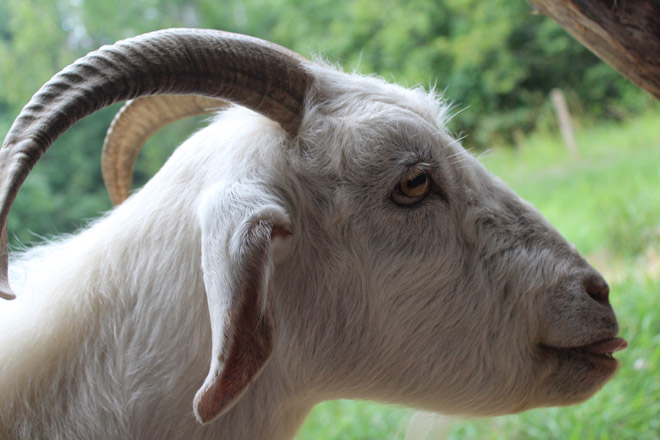By Terri Smith –
One of the most difficult things about being Amadeus’ surrogate mother is discerning which of his troubles are actually problems and which are just the problem of Amadeus: the goat who was never supposed to be here at all.

The next step – figuring out how I can help him – can be even more challenging.
His most recent trouble is mites. Goats are often itchy, and everything I have read about goats seems to confirm this. Part of it is all that hair they have; it gets itchy when it’s time to shed and they rub on everything they can to try to get rid of it. I thought for quite a while this year that perhaps this was why he was rubbing on fences so much, but about a month ago I realized the actual problem seems to be mites (we dealt with lice a year ago; similar story, but he no longer has lice).
Once I established the problem, I needed to find a solution. And here is where I fall. In this age of information, you would think finding a natural solution, or any solution, to goat mites or to any goat problem would be relatively simple. Especially since, as I read on one site, there are apparently something like 400 million goats in the world. But the reality is, there are so many goats because they are generally hardy creatures and they usually do well with little human intervention. And if they don’t, it seems no one much cares if they die. There is surprisingly little research on goats. For the most part, any studies that have been done on goats are simply incidental since a goat is like a cheaper version of a cow and so are sometimes used for studies instead.
I learned mites are usually a sign of a weak immune system. No surprise there: everything about Amadeus is a little bit weak. There are many supplements available to help, but here’s the catch: he doesn’t want to eat any of them.
As for addressing the mites directly, the “easy” way is Ivermectin, but here’s where the next problem arises. While effective, Ivermectin is hard on an animal’s liver. As well, goats are “off-label” and so dosage requires guesswork. Apparently sometimes goats die when dosed, though no one I’ve spoken to or read about online has reported actually seeing this. But, it’s Amadeus we’re talking about and I don’t want to risk it.
For the moment, I am trying to go the natural route. Since he won’t eat the various supplements I’ve tried, I’m feeding him rosehips and sunflower seeds and giving him a wide range of forage to choose from—I can sneak a pinch of mineral supplements each day into his seeds and still have him eat it. I covered the worst of his mangy spots with pine tar, and tried olive oil on the surrounding areas. He is less itchy and his missing hair has grown back, but now he’s both sticky and greasy. I’ve stopped with these treatments now as with winter coming on he needs his coat to be fluffy, not oily.
I prefer finding natural solutions to help Amadeus, but sometimes they don’t work and I get so stressed that I run down my own immune system worrying about his. I will keep researching, but for the time being Amadeus is his usual, happy, bumbling, ridiculous self. And with pet goats becoming the newest trend online, surely there will be more research available soon.
Terri Smith is a non-certified organic vegetable farmer in the Cariboo. She is passionate about writing, art, goats, and feeding good food to good people. She believes in following your heart, living your dreams, and taking care of the planet.
